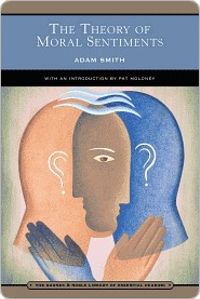
The Theory of Moral Sentiments
A Classics, Politics, Business book. Never complain of that of which it is at all times in your power to rid yourself. Adam Smith,...
About the Author:Born in Kirkcaldy, Scotland, in 1723, Adam Smith delivered a series of public lectures in Edinburgh beginning in 1748. The success of these lectures led ultimately to Smith's election to the Chair of Moral Philosophy at the University of Glasgow in 1752, where he distinguished himself as a teacher. Every morning of the term, Smith lectured his high-school-age audience in natural theology, ethics, and jurisprudence. The Theory of Moral Sentiments is a re-working of the ethics segment of his yearly cycle of lectures.
Download or read The Theory of Moral Sentiments in PDF formats. You may also find other subjects related with The Theory of Moral Sentiments.
- Filetype: PDF
- Pages: 464 pages
- ISBN: 9781411429338 / 0
rk4Jls5Wn4UW.pdf
More About The Theory of Moral Sentiments
Every faculty in one man is the measure by which he judges of the like faculty in another. I judge of your sight by my sight, of your ear by my ear, of your reason by my reason, of your resentment by my resentment, of your love by my love. I neither have, nor can have, any other way of judging about them. Adam Smith, The Theory of Moral Sentiments // In all governments accordingly, even in monarchies, the highest offices are generally possessed, and the whole detail of the administration conducted, by men who were educated in the middle and inferior ranks of life, who have been carried forward by their own industry and abilities, though loaded with the jealousy, and opposed by the resentment, of all those who were born their superiors, and to whom the great, after having regarded them first with contempt, and afterwards with envy, are at last contented to truckle with the same abject meanness with... foresight of our own dissolution is so terrible to us, and that the idea of those circumstances, which undoubtedly can give us no pain when we are dead, makes us miserable while we are alive. And from thence arises one of the most important principles in human nature, the dread of death, the great poison to the happiness, but the great restraint upon the injustice of mankind, which, while it afflicts and mortifies the individual, guards and protects the society. Adam Smith, The Theory of Moral Sentiments //
No haba tenido el gusto de leer a Smith de primera mano. Y debo decir que result ser todo un placer. El librito es muy bello, simple y elegante, finamente razonado y rebosante de humildad intelectual. Quizs la riqueza de las naciones resulte ser un poco ms spera por el tema, pero despus de leer ste, ya me dieron ganas de leerlo tambin.... The "Theory of Moral Sentiments" is based on Smith's assertion that we are both social ("mutally sympathetic") and self-interested beings, and that social order must be based on these two fundamental classes of moral sentiments.On this foundation, Smith derives three virtues that promote social order. The first is propriety, which is... "As to love our neighbour as we love ourselves is the great law of Christianity, so it is the great precept of nature to love ourselves only as we love our neighbour, or what comes to the same thing, as our neighbour is capable of loving us."











